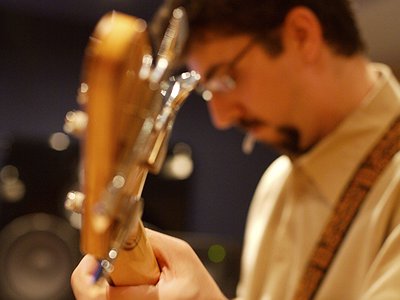In the 60s/70s, there were still some astounding success stories for recordings of contemporary and experimental composition – with Morton Subotnick's Silver Apples of the Moon, Stockhausen's albums for Deutsche Grammophon and Wergo or Steve Reich's Music for 18 Musicians on ECM coming to mind. With the odd exception, this seems to have come to a halt. What, do you feel, were some of the factors which made contemporary composition more commercially viable half a decade ago – and why has its public potential decreased so considerably ever since? Do you feel this decline is down to a change in the music itself or a change in the general perception of it? What have been success stories of your own catalogue so far?
Bob Lord / The public clearly has a fascination with certain things, certain tropes, at certain times. Take for example the concept (if not the execution) of "reality television,” which fixated viewers initially as something totally out there, but which is now in many ways the overall norm of the television programming that is aired every day in every market. Are we sure that the odd exceptions in music are not now the norm?
As we move forward in time, the compositions such as those you mentioned seem to me both ever-wild and increasingly tame simultaneously. Looking at the context of a work’s creation and initial public offering is of course crucial to understanding its impact and effect, and that impact cannot be diminished – we can’t de-riot The Rite of Spring – and the fact that access to experimental forms of music and composition is so readily available means that their influence is increased and expanded as a result. There was a time when to learn about gamelan music, people had to either go to Bali or seek out someone who actually was on-site ... but that time is over, and I believe that the multiplicity of styles, sounds, and modes of expression have been woven quite thoroughly into the fabric of today’s artistic life.
Michael Hammond / While there were certainly commercial successes in the 60s and 70s (which, we should remember, was the heyday of recorded music - not just classical but rock, jazz, etc.), that was also a period of extreme dogmatism for composition. Institutions were becoming more rigid and closed off to the outside world. This understandably turned a lot of people away from classical music. But I think a lot of the damage from that period is being undone. I mean, maybe this is too optimistic, but I think people's ears are more open right now to different sounds than they've been, maybe ever. Sure, it's harder to compete for people's pocketbooks, but that doesn't mean they're not listening.
It's especially heartening to me that some of our biggest successes (Sarah Kirkland Snider's Penelope, yMusic's Beautiful Mechanical, the Roomful of Teeth album, just to name a few) are some of our more uncategorizable releases. It shows just how hungry people are for new types of music.
Bob Lord / At PARMA we see very few composers who aren’t willing or desiring to, for example, adjust their row to give the chord precisely the right character, the right sound – compositional strictness still exists of course but I feel it is more finely integrated into the music we experience on a daily basis.
I do believe it is important to consider the relativity of the term "commercial success" – as successful as Reich’s piece has been, there is no argument that, as a fiscal transaction, it cannot even be discussed in the same breath as, for example, Katy Perry or the Beatles. But in the matrix of influence, which I think is a more nebulous but also in the end more telling gauge, the piece has had artistic legs that something like "Gangnam Style" (or whatever the inevitable equivalent of the day may be) never will. And without Stockhausen we never would have had "Tomorrow Never Knows" ... and on and on and on ...
Some of the most surprising and gratifying successes we have seen have been on the sync licensing side of the business – PARMA has a very active licensing arm engaged in placing music from our catalog in film, television, and other media, and frequently the music that is the most esoteric and "inaccessible" proves to be just the right fit for a particular sync usage against picture.
Dobrinka Tabakova / Perhaps it’s not so much that the recordings don’t exist, but our attitude towards them has changed. As Michael said, the recorded medium was at its height in the 60s and 70s, so no wonder there was a spotlight on creativity channelled that way. The way we document and distribute music is much faster now than before, that’s one of the main differences in my opinion. The creativity is still out there, just as strong.
Nimrod Boreinstein / If I think about my own music there are two recent success stories. My "Shell Adagio for string orchestra" was performed more than 30 times by 16 different orchestras during the past couple of seasons, including a recent Carnegie Hall concert in March 2012. This was the piece that started my collaboration with Boosey & Hawkes. "The Big Bang and Creation of the Universe", a recent large scale orchestral work in three movements, was recently performed by Maestro Ashkenazy and the Philharmonia Orchestra in February 2013. The Ashkenazy performance was really interesting, because it was completely sold out, 2.000 people attended it. And the program consisted of a Mozart piano concerto and the Mahler 4 symphony, apart from my work. It was a big success, there were many people, perfect strangers, who wrote me an email afterwards telling me this was wonderful and when was my next performance.
To me, new music in any time will usually not be very good. Only one percent or so of all the music is there to stay. It wasn't any different in the 18th century either. So getting audiences to come to a performance of just contemporary music is hard – because it could all be bad. So the idea of mixing it up is interesting. Even for the composers, because your music has to be good enough to stand up to Mozart. I don't think the question is about liking or not liking something. If you know what you're going to hear at a contemporary music concert, it's not good enough. You have to be surprised.
Interviews / About
The past, present and future of composition
15 Questions Round Table #1
Open ears & the matrix of influence

Bob Lord: Are we sure that the odd exceptions in music are not now the norm?




Content
- Learning to swim in the delta
- Open ears & the matrix of influence
- Enrichment & Cross-pollination
- Universal and timeless truths
- To collaborate or not to collaborate


